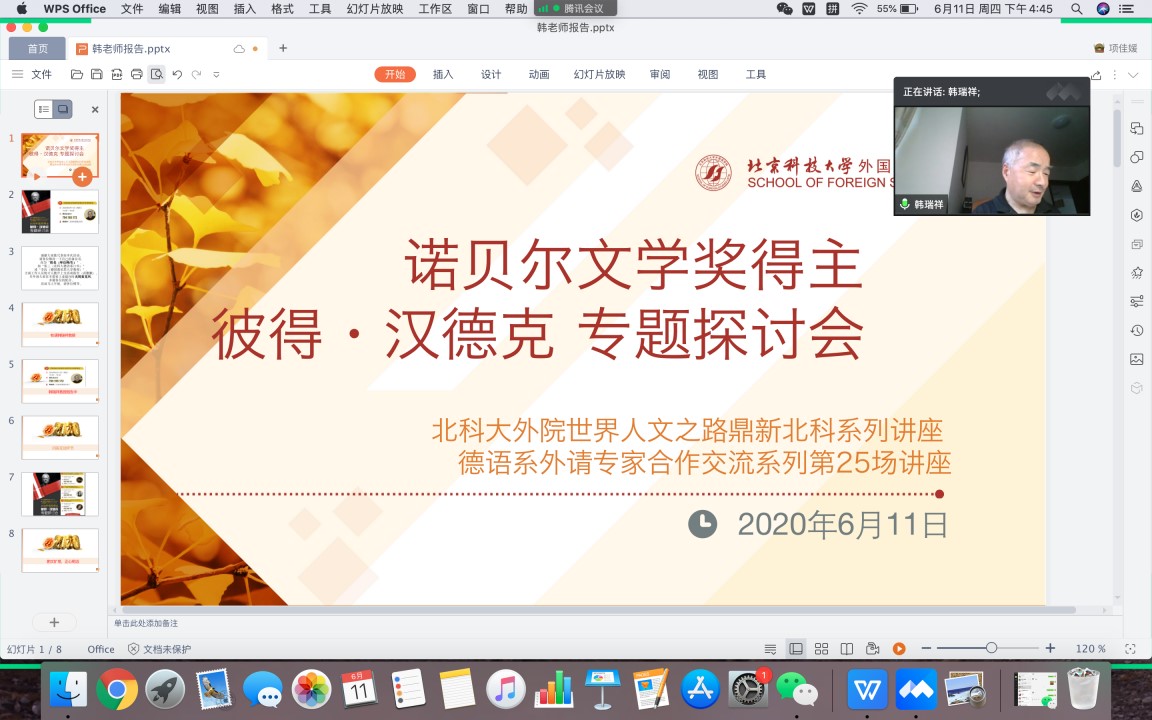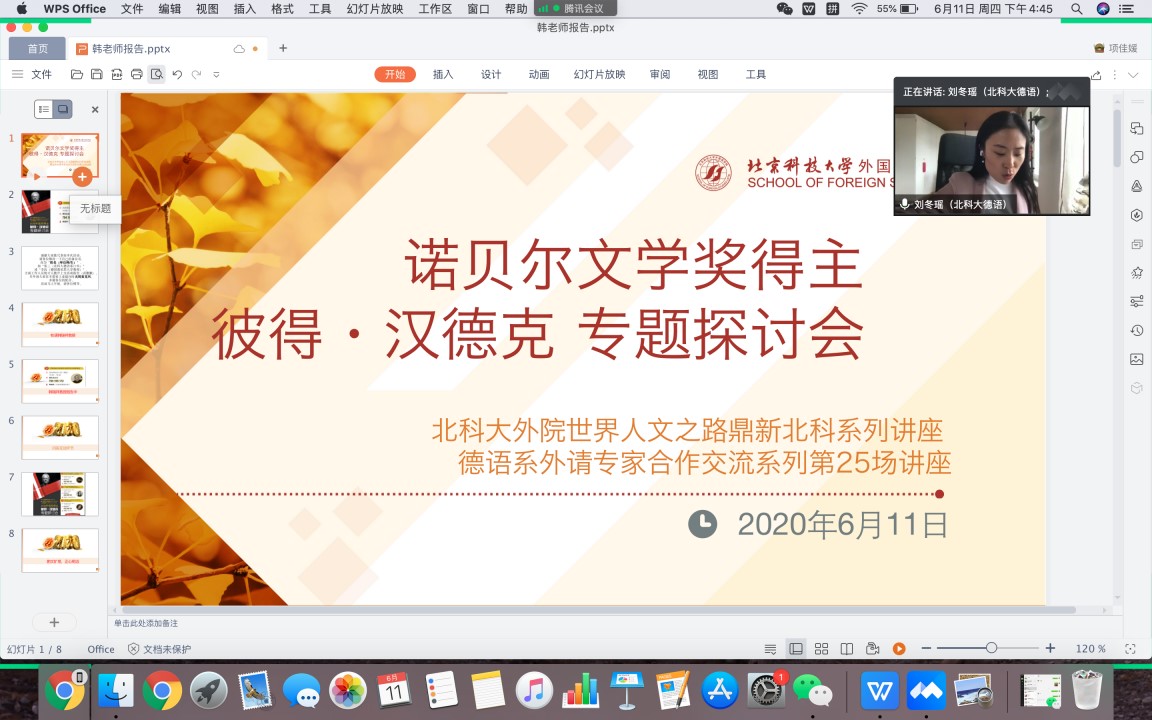The 1st Session of the Seminar on Peter Handke

At 15:30 on June 11, 2020, we had a great honor to invite Professor Han Ruixiang from the Department of German of Beijing Foreign Studies University (BFSU) to attend the 25th lecture of The Road to Worldwide Humanities Series Academic Activities & Series of Exchange and Cooperation with Experts invited by the Department of German. During the three-and-a-half-hour seminar, Professor Han gave a targeted and detailed introduction to Peter Handke, the winner of 2019 Nobel Prize in Literature. After his wonderful speech, Professor Han also had lively discussions with nearly 200 teachers, students and scholars from more than 30 universities and colleges, including Peking University (PKU), Tsinghua University (THU), Beijing Foreign Studies University (BFSU), Shanghai International Studies University (SISU), Xi’an International Studies University (XISU), Sichuan International Studies University (SISU), Dalian University of Foreign Languages (DLUFL), Tianjin Foreign Studies University (TFSU), Guangdong University of Foreign Studies (GDUFS), Beijing Language and Culture University (BLCU) and Beijing Institute of Technology (BIT).

The activity was presided by Liu Dongyao, an instructor from the Department of German. First, she briefly introduced Professor Han. He is a second-class professor, doctoral supervisor and the winner of Cross-century Talents of Ministry of Education. Professor Han is mainly engaged in German literature teaching and research, focusing on modern and contemporary Austrian literature. He has published three works and more than 60 papers. He also translated 18 works and edited four sets of literary masterpieces.

As the editor-in-chief of nine volumes of Peter Handke in China, Professor Han discussed about the new Noble Prize winner mainly from three aspects: first, three points with great significance in Handke’s literature creation; second, the acceptance of Handke at home and abroad; third, the controversies among academic circle after Handke won the Nobel Prize in Literature. Guided by Professor Han, the participators reviewed Handke’s dauntless speech in 1966 when he was invited to join the Gruppe 47 as a 24-year-old young writer. Then, along the time clues of more than 60 years, Professor Han sorted out Handke’s various literary works, aesthetic principles, drama theories and original intentions. During his lecture, based on rich translation experience, Professor Han made a reference to dozens of Handke’s works, and respectively gave detailed descriptions of Handke’s masterpieces, such as I am a Man Lives in an Ivory Tower, Offending the Audience and Self-accusation, Kaspar and Other Play, A Sorrow Beyond Dreams: A Life Story, The Left-Handed Woman and Repetition. In terms of the controversies over Handke’s domestic acceptance and the Noble Prize, Professor Han mainly introduced the process of Handke’s academic exchange activities in China in 2016 and expressed his opinions and suggestions. Professor Han analyzed the attitudes and reports of Europe media before and after Handke being awarded. At the end, Mr. Han repeated that Handke is a traditional Austrian writer with strong personality. In face of the misunderstandings and the imposed labels, Handke said, “Don’t label me and I don’t care about external attacks at all. I’m Handke. I want to write.”
After Professor Han’s speech, the participators actively asked questions online. Ma Xinran, an undergraduate enrolled in 2017 from the Department of German of the School of Foreign Studies (the SFS), took the lead in raising questions and asked about the selection of the translation of Die Wiederholung (Repetition). Later, several participators communicated with Professor Han online, including dean of the School of German, XISU Professor Zhang Shisheng, director of German of XISU and Secretary-General of Shaanxi Foreign Literature Society Professor Nie Jun, Assoc. Prof. Zhang Yan from the Department of German of BFSU, Assoc. Prof. Zheng Mengya from Sichuan International Studies University, Assoc. Prof. Wang Yanhui from BIT, instructor Liu Dongyao from the SFS, USTB and undergraduates, postgraduates and Ph.D students from SISU and other universities. They put forward their questions and opinions on the citation of Handke’s award acceptance speech, the translation of the titles of Handke’s works, self-citation and intertextuality and the interpretation of the content of the works. Professor Han respectively gave detailed answers and had heated discussions with the teachers and students.
The seminar lasted for nearly four hours. Professor Han showed his profound knowledge with a simple teaching style, which set up a vivid and lively image of Handke. The participators’ understanding of this Austrian writer is no longer limited to the Nobel Prize winner, and everyone has a more specific and indepth understanding of Handke’s life and works. At the end of the activity, the participators were reluctant to leave and expressed their gratitude for Professor Han’s patient instructions and respects for the SFS in building such an open platform for domestic German circle. During the epidemic, online seminar not only narrowed the distance between the colleagues and fellows, but also brought us closer to German classicse and the writers.
Contributor: Jin Yinglin, Liu Dongyao
